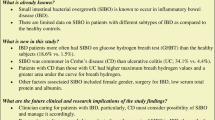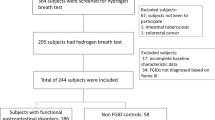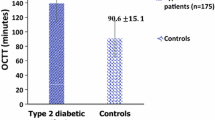Abstract
Background
Inflammatory bowel disease (IBD) consists of Ulcerative colitis (UC) and Crohn’s disease (CD). These two conditions share many common features—diarrhea, bloody stools, weight loss, abdominal pain, fever and fatigue. Small intestinal bacterial overgrowth (SIBO) is frequent in patients with CD but it has not been studied in UC Indian patients.
Aim
The study was planned to measure orocecal transit time (OCTT) and SIBO in UC and CD patients.
Methods
One hundred thirty-seven patients of IBD (95 UC and 42 CD) and 115 healthy controls were enrolled. OCTT and SIBO were measured by lactulose and glucose hydrogen breath test respectively. Concentration of hydrogen and methane were measured by SC microlyser from Quintron, USA.
Results
Mean ± standard deviation (SD) of OCTT in patients of IBD was significantly higher as compared to controls. Furthermore, OCTT was significantly higher in CD patients as compared to UC patients. It was also observed that occurrence of SIBO was significantly higher in IBD patients as compared to controls. The occurrence of SIBO in CD (45.2 %) was significantly higher as compared to patients in UC (17.8 %) group. Percentage of methane positive IBD patients (2.9 %) was significantly lower as compared to methane positive controls (24.4 %).
Conclusion
OCTT was significantly delayed in IBD patients as compared to controls and in CD patients as compared to UC patients. OCTT was significantly higher in SIBO positive IBD patients as compared to SIBO negative patients. Thus, we can suggest that delayed OCTT would have been the cause of increased SIBO in these patients.
Similar content being viewed by others
References
Kmiec Z. Cytokines in inflammatory bowel disease. Arch Immunol Ther Exp (Warsz). 1998;46:143–155.
Kathleen A, Jurenka JS. Inflammatory bowel disease part 1: ulcerative colitis pathophysiology and conventional and alternative treatment options. Altern Med Rev. 2003;8:247–283.
Ardizzone S, Bianchi Porro G. Biologic therapy for inflammatory bowel disease. Drugs. 2005;65:2253–2286.
Ardizzone S, Bollani S, Manzionna G, Bianchi Porro G. Inflammatory bowel disease approaching the 3rd millennium: pathogenesis and therapeutic implications? Eur J Gastroenterol Hepatol. 1999;11:27–32.
Fiocchi C. Inflammatory bowel disease: etiology and pathogenesis. Gastroenterology. 1998;115:182–205.
Binion DG, Fiocchi C. Immune modulation-is the environment important? In: McLeod RS, Martin K, Sutherland LR, Wallace JL, Williams CN, eds. Trends in Inflammatory Bowel Disease Therapy. Boston: Kluwer; 1996;39–48.
Sartor RB. Current concepts of the etiology and pathogenesis of ulcerative colitis and Crohn’s disease. Gastroenterol Clin N Am. 1995;24:475–507.
Hanauer SB. Medical therapy for Crohn’s disease. Curr Opin Gastroenterol. 1999;15:308–314.
Mishkin B, Yalovsky M, Mishkin S. Increased prevalence of lactose malabsorption in Crohn’s disease patients at low risk for lactose malabsorption based on ethnic origin. Am J Gastroentrol. 1997;92:1148–1153.
Rana SV, Sharma S, Kaur J, Sinha SK, Singh K. Comparison of lactulose and glucose breath test for diagnosis of small intestinal bacterial overgrowth in patients with irritable bowel syndrome. Digestion. 2012;85:243–247.
Toskes PP, Kumar A. Enteric bacterial flora and bacterial overgrowth syndrome. In: Sleisenger NH, Fordtran GS, eds. Gastrointestinal and Liver Disease Philadelphia. Philadelphia: WB Saunders; 1998:1523–1534.
Sellin JH, Hart R. Glucose malabsorption associated with rapid intestinal transit. Am J Gastroenterol. 1992;87:584–589.
Rana SV, Sinha SK, Sikander A, Bhasin DK, Singh K. Study of small intestinal bacterial overgrowth in North Indian patients with irritable bowel syndrome: a case control study. Trop Gastroenterol. 2008;29:23–25.
Pimentel M, Wallace D, Hallegua D, et al. A link between irritable bowel syndrome and fibromyalgia may be related to findings on lactulose breath testing. Ann Rheum Dis. 2004;63:450–452.
Rana SV, Kocchar R, Pal R, Nagi B, Singh K. Orocecal transit time in patients in chronic phase of corrosive injury. Dig Dis Sci. 2008;53:1797–1800.
Rana SV, Sinha SK, Lal S, Sikander S, Singh K. Small intestinal bacterial overgrowth in north Indian patients with celiac disease. Trop Gastroenterol. 2007;28:159–161.
Ghoshal UC, Ghoshal U, Ayyagari A, et al. Tropical sprue is associated with contamination of small bowel with aerobic bacteria and reversible prolongation of orocecal transit time. J Gastroenterol Hepatol. 2003;18:540–547.
Ghoshal UC, Ghoshal U, Das K, Misra A. Utility of hydrogen breath tests in diagnosis of small intestinal bacterial overgrowth in malabsorption syndrome and its relationship with oro-cecal transit time. Indian J Gastroenterol. 2006;25:6–10.
Pimentel M, Chow EJ, Lin HC. Eradication of small intestinal bacterial overgrowth reduces symptoms of irritable bowel syndrome. Am J Gastroenterol. 2000;95:3503–3506.
Castiglione F, Del Vecchio Blanco G, Rispo A, et al. Orocecal transit time and bacterial overgrowth in patients with Crohn’s disease. J Clin Gastroenterol. 2000;31:63–66.
Ghoshal UC. How to interpret hydrogen breath tests. J Neurogastroenterol Motil. 2011;17:312–317.
Jorge JM, Wexner SD, Ehrenpreis ED. The lactulose hydrogen breath test as a measure of orocecal transit time. Eur J Surg. 1994;160:409–416.
Pimentel M, Mayer AG, Park S, Chow EJ, Hasan A, Kong Y. Methane production during lactulose breath test is associated with gastrointestinal disease presentation. Dig Dis Sci. 2003;48:86–92.
Bond JH, Levitt MD. Use of pulmonary hydrogen (H2) measurements to quantitate carbohydrate absorption. Study of partially gastrectomized patients. J Clin Invest. 1972;51:1219–1225.
Acknowledgments
The authors would like to acknowledge the financial support given by the Indian Council of Medical Research (ICMR), New Delhi, no 5/4/3-2/07/NCD II.
Conflict of interest
None.
Author information
Authors and Affiliations
Corresponding author
Rights and permissions
About this article
Cite this article
Rana, S.V., Sharma, S., Malik, A. et al. Small Intestinal Bacterial Overgrowth and Orocecal Transit Time in Patients of Inflammatory Bowel Disease. Dig Dis Sci 58, 2594–2598 (2013). https://doi.org/10.1007/s10620-013-2694-x
Received:
Accepted:
Published:
Issue Date:
DOI: https://doi.org/10.1007/s10620-013-2694-x




